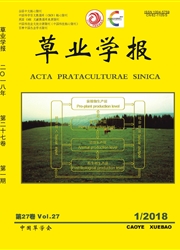

 中文摘要:
中文摘要:
作物根系分泌物通过土壤或其他介质产生的化感作用极为普遍,与作物连作障碍密切相关,对作物根系生长和产量具有一定影响。为寻求减小作物连作障碍的途径,本研究通过盆栽试验,探讨了不同供水水平(田间持水量的75%,60%,45%)下小麦根系分泌物丁香酚(2-甲氧基-3-烯丙基苯酚)和间作蚕豆对小麦根系生长特性及产量的协同影响。结果表明,丁香酚对单、间作小麦根体积和根干重及根长生长均具有抑制作用,表现为化感负效应。随供水水平的提高丁香酚对小麦根系形态的化感效应呈减弱趋势,其中丁香酚对间作小麦根体积、根长和根干重化感效应在75%供水水平处理下较45%供水处理分别低54.69%,26.70%和18.67%,单作小麦根体积、根长和根干重在75%供水处理中所受化感抑制作用较45%供水处理分别低33.32%,49.55% 和55.41%,单作和间作模式中丁香酚对75%供水处理的小麦根系形态的化感作用与45% 供水处理差异显著。间作与单作小麦相比,75% 供水水平下的丁香酚对间作小麦根系的化感效应小于单作小麦,并且种植模式与供水水平对根干重的交互效应显著。因此,生产实践中,通过合理的间作和优化灌溉可减轻造成连作障碍的化感负效应,进而克服连作障碍。
 英文摘要:
英文摘要:
The allelopathic effect of root exudates is quite common in soil and other media, and the effect due to the stress of continuous cropping often affects the root growth and yield of companion crops. This experiment, conducted under controlled environments, was to investigate the eugenol and intercropping effects on the root growth characteristics and yield of wheat (Triticum aestivum) under three water (75 ~, 60 ~ and 45 % of field capacity) supply conditions. Eugenol (2-methoxy-S-propenylphenol) exudates from wheat roots were used as the trial allelochemical. Results showed that eugenol at the rate of 300 X 10-6 mol/kg of soil negatively affected root volume, root dry weight and root length of wheat crops. The negative effect of eugenol on wheat roots en- hanced with a decrease of irrigation rate. There were significant differences between the 75% and 45% water supply levels. The negative effect on root volume, root length and root dry weight of intercropping wheat at 75% water supply conditions were lower by 54.69%, 26.70~, and 18.67% respectively than at 45% water supply conditions, and lower by 33.32%, 49. 55%, and 55.41% respectively in a monocropping system. In contrast, the wheat/soyabean intercropping system significantly weakened the allelopathie effect with little negative effect on root growth characteristics of wheat under the same water supply conditions. Cropping sys- tems and water supply significantly affected root dry weight which then had a significantly positive impact on grain yield of wheat. This study demonstrates that the negative allelopathic effect, often occurring with contin- uous cropping, can be weakened through optimizing cropping systems and improved water management.
 同期刊论文项目
同期刊论文项目
 同项目期刊论文
同项目期刊论文
 Relationships among soil respiration, soil temperature and dry matter accumulation for wheat-maize i
Relationships among soil respiration, soil temperature and dry matter accumulation for wheat-maize i Effects of Different Tillage Systems on Soil Properties, Root Growth, Grain Yield, and Water Use Eff
Effects of Different Tillage Systems on Soil Properties, Root Growth, Grain Yield, and Water Use Eff Quantification of SoilWater Competition and Compensation Using Soil Water Differences between Strips
Quantification of SoilWater Competition and Compensation Using Soil Water Differences between Strips Quantification of Soil water competition and compensation using soil water differences between strip
Quantification of Soil water competition and compensation using soil water differences between strip Higher yield and lower carbon emission by intercropping maize with rape, pea, and wheat in arid irri
Higher yield and lower carbon emission by intercropping maize with rape, pea, and wheat in arid irri Dry Matter Remobilization and Compensatory Effects in Various Internodes of Spring Wheat under Water
Dry Matter Remobilization and Compensatory Effects in Various Internodes of Spring Wheat under Water 期刊信息
期刊信息
